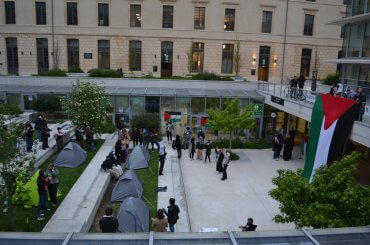The Law in These Parts – English trailer from The Law in These Parts on Vimeo.
I was fortunate enough to see “The Law in These Parts”, by Ra’anan Alexandrovicz at The Sundance Film Festival. It was, to put it mildly, a searing indictment of Israeli behavior on several fronts. The film sets out to examine how the legal groundwork (under Israeli law) for the occupation was conceived and put into practical use. The revelations aren’t pretty.
For one thing, you see an energized right-wing faction of the Israeli population trying to use any *legal* justification available to confiscate Palestinian land for the building of new settlements. When the Israeli Supreme Court actually ruled in favor of a Palestinian who had argued that there was no rational security-based reason for the confiscation of his land, an Israeli-military judge in the West Bank suggested to Ariel Sharon that he invoke the old Ottoman notion of dead land in future legal proceedings. Needless to say this approach has worked. When this former judge, a man who arguably is responsible for putting the settlement enterprise on legal footing, was asked if he thought the settlement project was the right move, he answered that he didn’t know and this was a question for the historians, not him. Sadly, but not surprisingly, this judge’s flippant attitude is shared by other judges.
Looking at legal opinions they’d written during the first intifada was apparently just a walk down memory lane for some of them; they noted how “moving” it was to see these opinions in front of them now two decades later. Too bad they didn’t find it moving that, as one judge acknowledged, Palestinian prisoners were tortured to produce “evidence” used in their courtrooms, and hence in those opinions. Another judge said matter of factly that when confronted with contradictory claims by Israeli prosecutors and Palestinian defendants his default position was to accept the authorities’ claims because the defendants have “an interest” in the outcome. (As if the government had no interest?)
This same judge, now wheel-chair bound, argued that all this had been necessary so that filmmaker Alexandrovicz could “go to the movies” without fear of being killed. The same nonchalance extends to Meir Shamgar, a former President of the Israeli Supreme Court. Alexandrovicz asks him if he thinks Israelis would accept the same sort of treatment in Israel proper that the Palestinians receive in the West Bank. The judge’s response is that this is a “theoretical question” and he won’t answer it.
Shamgar is also offended by the notion that his beloved court may have had a role in normalizing the occupation for the Israeli public by enmeshing itself in so many of the legalisms of the occupation. When told that an Israeli professor of law at Hebrew University had made that argument, Shamgar replied, “Only in Israel can you find a professor who would say that.”


In Palestine it may be that even the stones weep, but the hearts of the governments of the rest of the world are like stones from which tears cannot be squeezed.
It is true the Israeli High court has made some perverse judgements non more so than the recent Yesh Din v IDF ‘the quarries case’, a more in depth look at the way Israeli Governments have used various legal mechanisms to cheat the Palestinians out of their land and property can be found in an excellent publication by B’tselem ‘ By Hook and by crook’ Israeli settlement in the West Bank, July 2010.